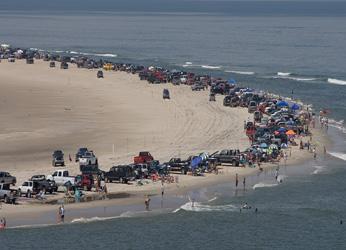For years folks have used off-road vehicles to negotiate some of the farther reaches of Cape Hatteras National Seashore. And for years the National Park Service failed to develop a management plan for those ORVers. And now it's time to pay the piper.
On April 3 a federal judge will consider a request by Defenders of Wildlife and the National Audubon Society to restrict ORV access to South Ocracoke, Hatteras Spit, North Ocracoke, Cape Point, South Beach and Bodie Island Spit for up to three years because of the presence of piping plovers, which have been considered a "threatened" species under the Endangered Species Act since January 1986.
The lawsuit contends the Park Service has run afoul of the National Park Organic Act, the National Environmental Policy Act, the Migratory Bird Treaty Act, the enabling legislation for the seashore, and the Park Service's own Management Policies by implementing an interim ORV management plan and failing to produce a long-term management plan.
The National Park Service’s Interim Plan and the ORV use it allows are substantially harming – and will continue to harm – important populations of endangered and threatened sea turtle species, threatened, special concern, or significantly rare bird species, and a threatened plant species, as well as other natural resources, serenity, and other recreational uses of the Seashore generally, reads one of the claims.
On Saturday, in a protest against the conservation groups, an estimated 200 ORV supporters showed up in a gale at Cape Point on the seashore to attend a rally.
In Sunday's editions of the Charlotte Observer, meanwhile, outdoors writer Tim Higgins satirized the situation by looking into the future to listen to a conversation between a young boy and his grandfather over why they no longer fish at Cape Point.
What's unfortunate is that the Park Service might have avoided this situation by acting sooner on developing a management plan for ORVs.




Add comment